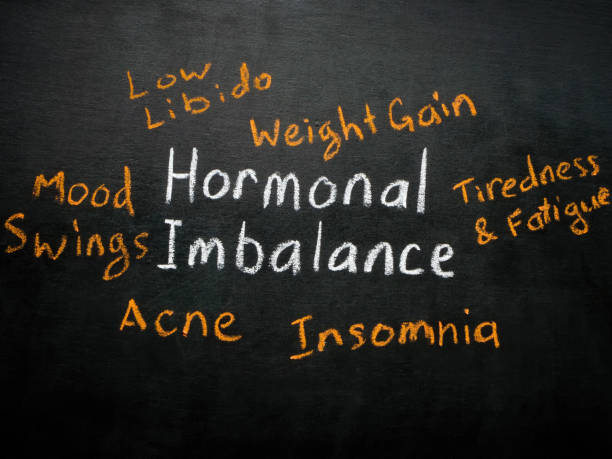Hormones are like messages to your body. It sends signals to control mood, energy, as well as fertility, sleep, and many other functions. If your levels are too far or too low, you could experience a feeling of “off” in ways that are difficult to pinpoint. With the proper information, you’ll be able to detect the signs early and return to feeling normal.
In this article, we’ll go over the causes of hormonal imbalance, walk through the most common signs associated with hormonal imbalance. We’ll also present the most effective treatment options for hormone imbalance. As you go, you’ll discover practical suggestions that you can apply right immediately, and recommendations for speaking to your doctor.
What is a Hormonal Imbalance?
Simply put, the way it works is that a hormonal imbalance occurs when your endocrine glands release too much or not enough of the hormone. Since hormones function in a way that they interact, minor changes can affect several systems. For instance, thyroid hormones affect metabolism and heart rate, while insulin is responsible for transferring sugar into the cells. So, if one hormone is beyond its range, other hormones could follow, which may cause symptoms to become more complicated and delay the timing of treatment.

Common Causes of Hormonal Imbalance
The causes can vary based on gender, age, and medical history. Certain patterns are seen frequently.
- Life cycles: Stages such as menstrual cycles, puberty, pregnancies, postpartum, menopause, and perimenopausal cycles, naturally alter estrogen, progesterone, and testosterone. In the same way, andropause may gradually reduce testosterone levels in males. Since these shifts are to be expected and expected, it is important to distinguish normal from disruptive symptoms.
- Thyroid Issues: Problems such as hypothyroidism (low thyroid hormone) and hyperthyroidism (high thyroid hormone) are the most frequent causes. If you experience an increase in weight, fatigue, or temperature sensitivity, a thyroid test is an easy initial step.
- Metabolic Problems: It causes type 2 diabetes, alter blood sugar control, as well as the hormones that regulate it, such as leptin or Ghrelin, which affect appetite. Additionally, certain disorders like polycystic ovary syndrome (PCOS) are associated with an increase in androgens with insulin resistance.
- Sleep and Stress: Since cortisol has a rhythm that is consistent throughout the day that is why chronic stress, inadequate sleep, or work shifts can cause the curve to flatten. This means that you could be experiencing brain fog, cravings, and irritability.
- Medicines and lifestyles: Hormonal birth control, thyroid medication, steroids, and a few psychiatric medications can alter levels. Alcohol, smoking, or eating low-protein diets and intense exercise can all make hormones unbalanced.
- Conditions that are underlying: Issues such as autoimmune diseases, pituitary and adrenal disorders, and ovarian or testicular problems and tumors, although not as common, can cause substantial changes. So, any persistent or serious symptoms warrant a thorough examination.
Symptoms of Hormonal Imbalance
Since hormones affect nearly every system, the symptoms of hormones vary widely. Yet, certain clusters are common.
- Weight and energy: Unexplained weight loss or gain or changes in appetite could be a sign of thyroid or insulin issues. Also, feeling energized during the night but feeling tired at the start of the day is often a sign of a cortisol imbalance.
- The effects of mood: These changes and cognition, such as anxiety or low mood, irritability, as well as brain fog and inability to focus, are typical. Though many factors influence mood, the rapid mood changes that are linked to patterns of stress or cycles indicate the presence of a hormone trigger.
- Hair, skin, and changes in the body: hair loss, acne, hirsutism (excess growing hair), dry skin, and nails that are brittle nails could indicate thyroid androgen or estrogen shifts. In the same way, fluid retention and swelling are common with changes in progesterone.
- Reproductive health: irregular cycles, heavy bleeding, hot flashes, PMS, as well as low libido levels as well as erectile dysfunction, and difficulties with fertility can all be indicators of imbalances. Furthermore, PCOS often includes irregular cycles as well as acne or insulin resistance.
- Temperature and sleep: Hot flashes and insomnia often refer to cortisol or estrogen changes. Cold intolerance may indicate low thyroid.

If the pattern persists for longer than a couple of weeks, think about tracking the symptoms. Bring your notes to your doctor, who will then order targeted tests.
How Doctors Diagnose a Hormonal Imbalance
Your doctor will first examine your symptoms, medication cycle history, medications, and the way you live. Then, they can request blood tests to determine TSH, Free T4 and free T3 (thyroid), and rapid glucose levels and insulin (metabolic), HbA1c (long-term glucose), Estradiol, progesterone, LH, FSH (ovarian function), testosterone (total and free), and DHEA-S, cortisol, and prolactin. Since timing is important, certain tests should be performed on specific cycles or in the early morning. Imaging tests, such as pituitary or thyroid MRI, are reserved for specific tests.
Treatment for Hormonal Imbalance
The treatment plan will be based on the underlying cause as well as the severity of the condition and your objectives. Most plans mix the effects of lifestyle changes with targeted treatments.
- Thyroid therapy: To treat hypothyroidism, levothyroxine is a replacement for an inactive hormone. To treat hyperthyroidism antithyroid medicines such as radioactive iodine, radioactive iodine, and surgical procedures may be employed. Regular labs fine-tune dosing.
- Metabolic Support: To enhance insulin sensitivity, physicians typically begin with nutrition, exercise, sleep, and stress management, and could include metformin and GLP-1 receptor antagonists as needed.
- Management of PCOS: Balanced exercise, nutrition, inositol supplements, as well as cycle control with oral contraceptives and progesterone, could aid. If the goal is to have fertility for you, ovulation inducers can be looked at.
- Menopausal and perimenopausal therapy: (estrogen mixed with or without progesterone) can help reduce heat flashes as well as sleep issues and dryness of the vagina when the benefits outweigh the risks. Alternatives to hormones are SSRIs/SNRIs, gabapentin, and vaginal moisturizing agents.
- Testosterone problems: Men with low testosterone are candidates for treatment with testosterone therapy following confirmation of regular low levels and ruling out the possibility of reversible causes. Monitoring is essential.
- Sleep and stress: The use of cognitive behavioral strategies, such as mindfulness and consistent sleep-wake routines, can help reset cortisol levels. Short daytime light exposure and evening dim light support melatonin.
- Relief of symptoms targeted to the patient: Acne treatments, hair loss treatments, and vaginal estrogen therapy for GSM (genitourinary menopausal syndrome) may address particular issues as the root causes are addressed.

Always consult an authorized doctor, since self-treating hormones may cause adverse effects or mask larger issues.
Everyday Habits That Support Hormone Health
Little, consistent steps usually shift hormones in the proper direction.
- Create balanced meals: Look for protein, vibrant fruits and vegetables, carbs that are high in fiber, and healthy fats. For instance, mix eggs with oats and greens in the morning to ensure provide steady glucose.
- Timing your carbs: Since even the most nutritious foods can increase blood sugar levels, you should incorporate fiber and protein and think about a quick stroll after meals to increase the response of insulin.
- Lifting and Moving: At least three times per week improves insulin sensitivity and also supports healthy growth hormone and testosterone. In addition, walking every day reduces stress hormones.
- Prioritize sleeping: Maintain an unchanging schedule, keep the room cool, and turn off the lights about at least an hour before bedtime to help support the production of melatonin. If you are prone to snoring or awake tired, inquire about sleep apnea testing.
- Reduce stress: Breathing exercises, five-minute stretches, or even journaling can reduce cortisol. Additionally, setting limits around screen time and work can help your nervous system get back on track.
- Be sure to review your supplements with care: Vitamin D, magnesium, omega-3s, and inositol magnesium (for those who suffer from PCOS) are supported by evidence. However, you should first test if you can, and then discuss your interactions with your doctor.
When to See a Doctor
Consult a doctor if you are experiencing rapid weight fluctuations and new acne that is severe and missed periods for 3 months (not pregnant) or hot flashes that interfere with sleep, depression due to cycles and breast discharge, extreme hair loss, or symptoms of thyroid illness (such as the appearance of heart palpitations or neck swelling). A prompt diagnosis can avoid complications and help speed the healing process.

Since hormones influence a large portion of your mood and how you feel, even a small change can have a significant impact. The positive aspect is that through precise tracking, intelligent changes to your lifestyle, and, in the event of medical intervention, many people find their equilibrium. Begin by identifying the top three symptoms you experience, and then schedule a visit to a doctor and inquire about specific tests. Create simple routines for the food you eat, your movement, and sleep. You can also reduce stress. As you go, you’ll develop a steady hormonal cycle, and you’ll feel more at ease with yourself.



